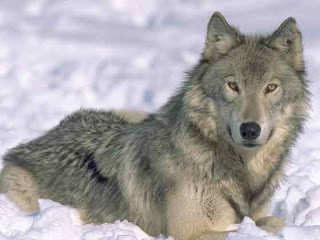The wolf, pursuing its lightning reconquest of France, has reached the Vosges Mountains on the Alsace-Lorraine border for the first time in 80 years.
After two decades of pro- and anti-wolf battles between nature-lovers, shepherds and politicians, even some supporters of the grey wolf (Canis lupus) are growing alarmed by the rapid progress of the world largest wild canine through the French countryside.
A mystery animal which has been attacking sheep in the Vosges since April has been identified by a remote-control camera as a wolf.
A handful of Italian wolves, which recolonised the French Alps around 1993, are thought to have multiplied to about 200 animals in 20 packs, reaching as far west as Cantal in Auvergne and as far north as Franche-Comté on the Franco-Swiss border, and now the Vosges. Within a decade, one expert predicted yesterday, the wolf could have ranged as far as the large forests just south of Paris.
A delegation of Alpine shepherds' leaders and local politicians will petition the environment minister, Nathalie Kosciusko-Morizet, this week for the right to hunt wolves at will. Under the present rules, the wolf – protected under European law – can be shot legally only by government marksmen or by shepherds trained and licensed to defend their flocks from an actual wolf attack.
In practice, since the "anti-loup" code was agreed in 2004, only four wolves have been killed in France. Shepherds' leaders want the rules changed to allow them to organise hunting parties.
Daniel Spagnou, the mayor of Sisteron in Alpes-de-Haute-Provence, wrote a blistering open letter to Ms Kosciusko-Morizet earlier this month, accusing her of "blindly following" the advice of environmentalists and allowing sheep flocks in high alpine summer pastures to be "plundered" by wolves.
The French government authorised the official hunting and shooting of a wolf in Alpes-de-Haute-Provence last weekend after 62 ewes fell into a ravine while fleeing an attack.
There have been 66 confirmed wolf attacks in France so far this year, compared with 86 in the whole of last year.
Pro-wolf groups say there is no evidence that attacks are "out of control", although some accept that the rapid spread proves tougher action is needed. Jean-Marc Moriceau, a wolf expert and the author of Men Versus Wolves, The 2,000 Years War, said: "We should organise a wolf parliament, bringing together shepherds, ecologists and government... We need a way of protecting flocks and managing the wolf population."
At the present rate of progress, Mr Moriceau said, wolves would reach the forests 50 miles south of Paris in 10 to 15 years.
Until the late 18th century, long after the last wolf was shot in Britain, wolves lived just across the Channel in the Pas de Calais. However, Canis lupus is not expected to knock on Britain's door any time soon. Western and northern France is no longer wooded or wild enough to sustain them.
After two decades of pro- and anti-wolf battles between nature-lovers, shepherds and politicians, even some supporters of the grey wolf (Canis lupus) are growing alarmed by the rapid progress of the world largest wild canine through the French countryside.
A mystery animal which has been attacking sheep in the Vosges since April has been identified by a remote-control camera as a wolf.
A handful of Italian wolves, which recolonised the French Alps around 1993, are thought to have multiplied to about 200 animals in 20 packs, reaching as far west as Cantal in Auvergne and as far north as Franche-Comté on the Franco-Swiss border, and now the Vosges. Within a decade, one expert predicted yesterday, the wolf could have ranged as far as the large forests just south of Paris.
A delegation of Alpine shepherds' leaders and local politicians will petition the environment minister, Nathalie Kosciusko-Morizet, this week for the right to hunt wolves at will. Under the present rules, the wolf – protected under European law – can be shot legally only by government marksmen or by shepherds trained and licensed to defend their flocks from an actual wolf attack.
In practice, since the "anti-loup" code was agreed in 2004, only four wolves have been killed in France. Shepherds' leaders want the rules changed to allow them to organise hunting parties.
Daniel Spagnou, the mayor of Sisteron in Alpes-de-Haute-Provence, wrote a blistering open letter to Ms Kosciusko-Morizet earlier this month, accusing her of "blindly following" the advice of environmentalists and allowing sheep flocks in high alpine summer pastures to be "plundered" by wolves.
The French government authorised the official hunting and shooting of a wolf in Alpes-de-Haute-Provence last weekend after 62 ewes fell into a ravine while fleeing an attack.
There have been 66 confirmed wolf attacks in France so far this year, compared with 86 in the whole of last year.
Pro-wolf groups say there is no evidence that attacks are "out of control", although some accept that the rapid spread proves tougher action is needed. Jean-Marc Moriceau, a wolf expert and the author of Men Versus Wolves, The 2,000 Years War, said: "We should organise a wolf parliament, bringing together shepherds, ecologists and government... We need a way of protecting flocks and managing the wolf population."
At the present rate of progress, Mr Moriceau said, wolves would reach the forests 50 miles south of Paris in 10 to 15 years.
Until the late 18th century, long after the last wolf was shot in Britain, wolves lived just across the Channel in the Pas de Calais. However, Canis lupus is not expected to knock on Britain's door any time soon. Western and northern France is no longer wooded or wild enough to sustain them.
Post Title
→Conservationists express concern over French wolf cull.
Post URL
→https://national-grid-news.blogspot.com/2011/07/conservationists-express-concern-over.html
Visit National-grid-news for Daily Updated Wedding Dresses Collection




